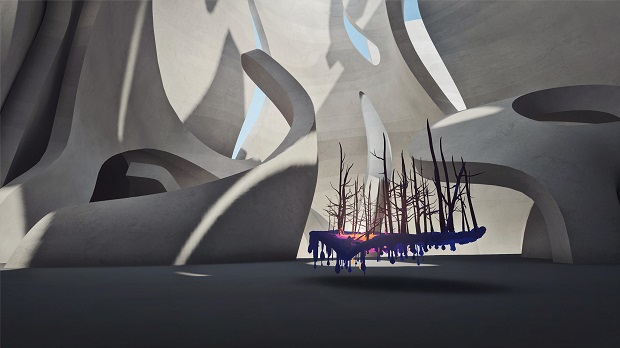 Back to selection
Back to selection
Kaleidoscope and the Museum of Other Realities Step In to Help the VR Industry During the Pandemic
 Danny Bittman's Night Snow at the Museum of Other Realities
Danny Bittman's Night Snow at the Museum of Other Realities One thing that’s been uplifting to observe throughout all the recent closures of movie theaters, festivals, and other cultural institutions has been how individuals and companies have stepped in to provide relief, support, and camaraderie during an unprecedented crisis. This is true in the virtual and augmented reality community as much as in the broader film industry, as content creators and distributors have come together to support each other as their work has come to an essential standstill.
Of course, some companies and services have seen an uptick in their business, as consumers explore using VR products to hold meetings, even in gaming platforms like Rec Room that weren’t intended as business solutions. Likewise, the social music platform WaveXR and the VR cinema space Bigscreen have provided ways for isolated individuals to still unite virtually with a larger audience. But despite increased use among some consumers and businesses, a plethora of cancelled contracts and delayed projects have combined to create an uncertain future for producers, and the loss of premieres at festivals like SXSW and Tribeca has been just as devastating for VR filmmakers as for traditional ones, besides the closing of VR-centered location-based entertainment spaces.
Amidst this turmoil two organizations are joining forces to support these artists and businesses: Kaleidoscope, an XR networking and funding organization that I wrote about in 2017, and the Museum of Other Realities, a virtual gallery that showcases VR artists and connects them with funding and audiences; Danny Bittman’s Night Snow, seen above, is one piece that has shown at MOR. On March 16 Kaleidoscope’s René Pinnell and MOR’s Robin Stethem and their associates announced that they would use their relative strengths—Kaleidoscope’s online market and MOR’s capacity to host large groups online—to host premieres, screenings, conferences, or any related events. And they have continued to reach out to other partners: on March 23 Kaleidoscope announced another project with AmazeVR to host a showcase for distribution-ready VR films on April 24. Details for submitting projects or attending that event are here.
Virtual reality by its nature does have the advantage of being able to be distributed online and viewed while buyers, funders, and audiences continue social distancing at home, and these types of efforts are taking full advantage of that. Those interested in showing their work with MOR or Kaleidoscope should write to the email address events@kaleidovr.com or reach out to Pinnell, Stethem, or any of their colleagues to find out more, but Pinnell also provided Filmmaker with a statement about their purpose in the weeks going forward:
Pinnell: In many ways events are the lifeblood of the VR/AR industry. It’s where artists are discovered and where deals get done. The XR industry is a relationship-based business. It’s all about who you know and building trust and friendships. And events are still the best way to form and solidify working relationships. But now that we are entering a new world where in-person events are no longer safe for at least the next three to six months, many artists and professionals are at risk of having their careers and livelihood significantly disrupted. At Kaleidoscope our mission has always been to help artists secure the funding and support they need to be successful. By bringing together artists and industry at highly curated events we’ve been able to help XR creators raise millions for amazing projects like Spheres, Battlescar, Vestige, and Terminal 3. But we realized early on that the only want to scale up events and support more artists was to move our events online. So over the past few years we built the Kaleidoscope platform to help us produce, manage, and promote online events. Until recently all of our online events were hosted via streaming video, because the available social VR apps were either designed for small groups or were aesthetically unappealing. That all changed when I discovered the Museum of Other Realities. It is the first virtual venue that is architecturally stunning and designed for large audiences. After hosting our First Look Market there last month, I firmly believe the Museum of Other Realities is a game changer.
Witnessing the cancellation of major festivals like SXSW, Tribeca, and Laval Virtual as well as countless local events, Robin and I felt compelled to act. Together, Kaleidoscope and the Museum of Other Realities have the tools and resources needed to help migrate our industry’s events into virtual reality. So we wanted to get the word out that we are here to help. If you’ve had to cancel your festival, conference, or industry gathering, then we want to hear from you. Or if you’re an artist who has had to indefinitely postpone your premiere, let us know. We can help. Please email us directly at events@kaleidovr.com to discuss how to host your events in virtual reality.
Now is the time to come together as a community to support the artists and industry professionals most impacted by this global crisis. And until we get to the other side of the pandemic, that means coming together in virtual reality.
